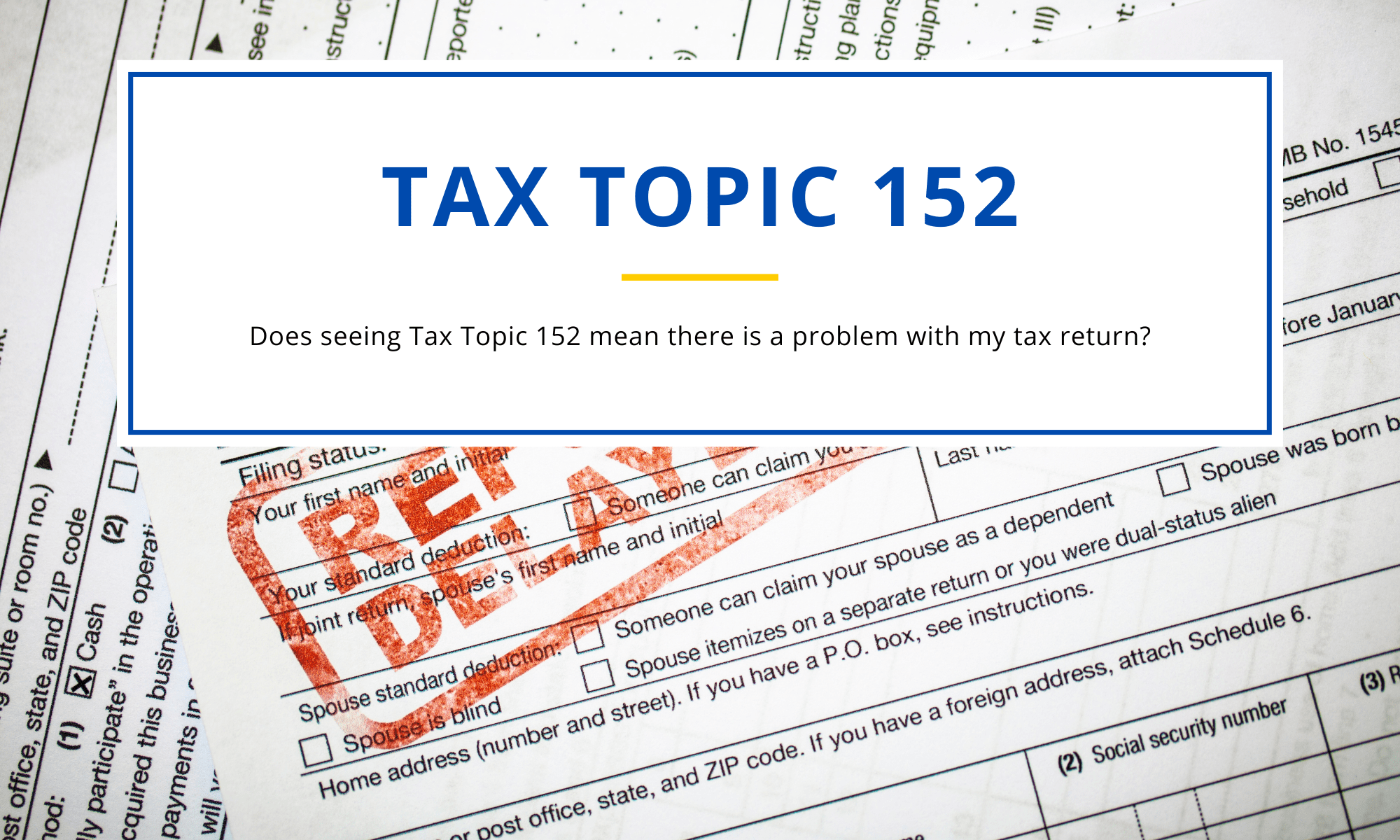
Tax Topic 152: A Complete Guide To Refund Information 2025-2026
When you check the IRS Where’s My Refund? tool and see Tax Topic 152, it means your return is being processed. It’s not an audit notice or a problem just a generic IRS message. According to the IRS, 9 out of 10 refunds are issued within 21 days, but if you see Tax Topic 152, your refund may take longer depending on credits, security checks, or filing method
Tax Topic 152 in 2026
If you’ve filed your tax return and are seeing Tax Topic 152 in the IRS “Where’s My Refund?” tool, don’t worry it’s not a red flag. It simply means your return is still being processed. However, it can also be a sign that your refund may take a little longer. This happens often when claiming certain credits, filing amended returns, or during IRS backlog periods early in the season.
Example: John filed electronically on Jan 29, but because he claimed the Earned Income Tax Credit, his refund wasn’t issued until Feb 20 — a standard mid-February delay by law.
best accounting firms for small business
What Does Tax Topic 152 Mean?
Tax Topic 152 is a generic IRS code that appears when you check your refund status online or in the IRS2Go app. It confirms that the IRS has received your return and is processing it.
Importantly, Tax Topic 152 does not mean you’re being audited or that something is wrong. It simply means your return needs additional review before the refund can be released.
Affordable CPA services in tampa, florida, US
What can I do to avoid delays?
To reduce refund delays, follow these steps:
-
Double-check your Social Security number, bank details, and reported income.
-
File electronically the IRS processes e-filed returns much faster than paper ones.
-
Select direct deposit instead of a paper check for the quickest delivery.
-
Respond promptly if the IRS requests additional documents.
-
File early in the tax season, since returns filed near the April deadline often face backlogs.
By law, refunds claiming the Earned Income Credit (EITC) or Additional Child Tax Credit (ACTC) will not be issued before mid-February, even if you filed early.
Explore best accounting firms in United states
Tax topic 152 refund information
Refunds are issued in two ways:
-
Direct deposit is the fastest and safest option, available in up to three bank accounts.
-
Paper check is slower, as it requires printing and mailing.
The IRS aims to issue most refunds within 21 days of e-filing. Paper returns take longer, usually 4–6 weeks. If Tax Topic 152 appears, it means extra review is needed and your refund could take longer than the standard timeline.
How IRS's Processing Time Work?
The IRS outlines a standard processing timeline, aiming to issue most tax refunds within 21 days of e-filing. Understanding this timeline is essential for setting realistic expectations. However, when specific conditions necessitate additional review, Tax Topic 152 indicates such exceptions, which can extend the processing time.
Example: Anna filed on Jan 27 and saw Tax Topic 152 on Jan 29. She received her refund on Feb 20. Why the delay? She claimed the Additional Child Tax Credit.
Tips to Speed Up Your Refund in 2026
-
File early in the season to avoid a backlog.
-
E-file and choose direct deposit.
-
Avoid typos and double-check Social Security numbers.
-
Don’t guess – report only verified income.
-
Respond promptly if the IRS contacts you for verification.
2026 Refund Delays Update
In 2026, the IRS implemented stricter fraud filters to protect against identity theft. As a result, even accurate returns may face 1–2 week verification delays, especially if:
-
You’re a first-time filer using a new bank account
-
You claimed large refundable credits
-
You filed with unusual income or deduction patterns
Factors Contributing to Extended Processing Times
Tax returns may take extra time if:
-
You filed an injured spouse claim
-
You included an ITIN application
-
You filed an amended return
-
You submitted special forms like Form 1042-S for non-residents
Proactive tips to speed up refunds
To get your refund faster in 2026:
-
Gather all W-2s, 1099s, and deduction receipts before filing
-
Use reliable software like TurboTax or H&R Block for accuracy
-
File electronically and choose direct deposit
-
Avoid guesswork — only enter verified income
-
Respond quickly to any IRS letters or verification requests
Conclusion
Tax Topic 152 doesn’t mean trouble it simply means the IRS is still processing your return. While most refunds arrive in 21 days, credits, fraud filters, or paper filings can cause longer waits. By filing early, e-filing with direct deposit, and keeping your return accurate, you’ll minimize delays.
Stay patient, keep checking the IRS “Where’s My Refund?” tool, and know that most taxpayers receive their refunds without any issues.
FAQs
Is Tax Topic 152 a sign of an audit?
No. It’s a generic IRS message showing your return is being processed, not an audit.
How long will my refund take after seeing Tax Topic 152?
Most refunds are issued in 21 days, but 4–6 weeks is possible if further review is required.
What causes Tax Topic 152 to appear?
Common reasons include filing errors, refundable credits, identity checks, or paper returns.
Can I speed up my refund?
Yes — file electronically, choose direct deposit, and reply quickly to any IRS requests.
Does Tax Topic 152 affect my refund amount?
No. It only affects the timing, not the dollar amount.
How often does the IRS update refund status?
Once every 24 hours, usually overnight.
Does Tax Topic 152 apply to both e-file and paper returns?
Yes — it appears for both methods, since it only means “processing.”
What should I do if my refund takes longer than 6 weeks?
Contact the IRS directly, as they may need to verify your identity or documents.
Follow SKFinancial on Facebook / Twitter / Linkedin / Youtube for updates.














